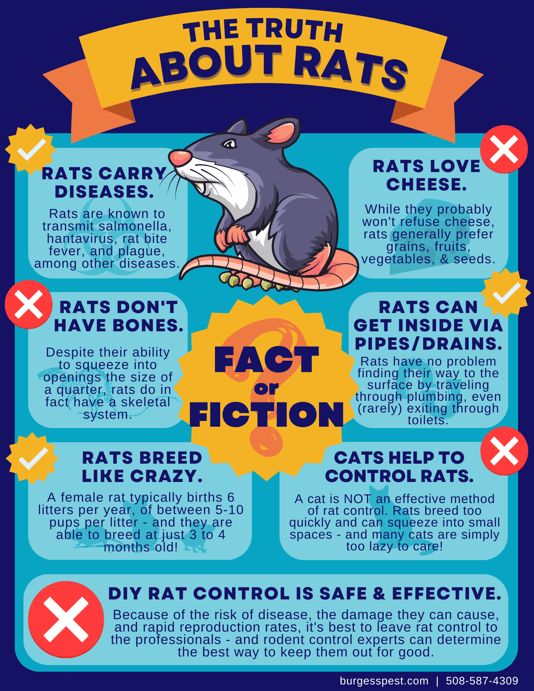We've been coexisting with rats in Massachusetts for centuries, but recently, their populations seem to be exploding: Over this past summer, Boston and surrounding communities faced a rat invasion that had (and still have) city officials and residents alike scurrying to find the solution.
When you're trying to solve a pest problem of any kind, a quick Google search provides thousands of sites that might contain misinformation that could lead you down the wrong path on your journey to a pest-free home - the infographic below debunks some common myths about rats.
- Fact: Rats carry diseases. Rats are known to spread a number of different diseases that are transmitted through bites or scratches, direct contact with their waste or bodily fluids, ingestion of contaminated food, or inhalation of contaminated air.
- Fiction: Rats love cheese. Rats are not picky eaters (hence why we often see them around trash!) and will probably not refuse cheese if offered, but they prefer grains, nuts, seeds, vegetables and fruits.
- Fiction: Rats don't have bones. Their ability to squeeze into impossibly small spaces has led to the rumor that rodents don't have bones, but mice and rats do in fact have a skeletal system - it's just much more flexible than ours!
- Fact: Rats can get inside your home via pipes/drains. This sounds like the stuff nightmares are made of, but it's true: Rats can gain access to your home via plumbing and have been known to emerge from toilets (thankfully, that's rare).
- Fact: Rats breed like crazy. Rats are infamous for their reproduction rates. One female rat typically births 6 litters a year, with between 5-10 pups in each litter. When you consider that rats are able to breed at just 3 to 4 months of age, it's no small wonder that rat infestations get out of control quickly.
- Fiction: Cats help to control rat populations. Not to say that there's zero chance of a cat helping to deter or even sometimes hunt rodents, there is certainly no guarantee. Because rats reproduce so rapidly and can squeeze into tiny areas (and, frankly, cats do everything of their own accord), a cat is not a recommended pest control method.
- Fiction: DIY rat control is safe and effective. There are plenty of reasons that rodent control is best left to the professionals: Rats can cause structural damage, pose health hazards, and breed at rates that are impossible to keep up with. Although there are DIY methods of prevention, a rodent control expert has the ability to safely and effectively rid your home of rats, find out how they got in, and determine the best way to keep them out for good.
And, if you need one more reason to call the experts at Burgess Pest for a rodent problem, here it is: An estimate is always free.
Team up with the power of Pad Protection for year-round pest control, and upgrade to add Home Sealer & Sanitizer + Insulation Cleanout with TAP® insulation to keep rodents and insects away for good - get started with an estimate today!
Want more tips? Download your free copy of our Fall 2022 Pest Guidebook here!



